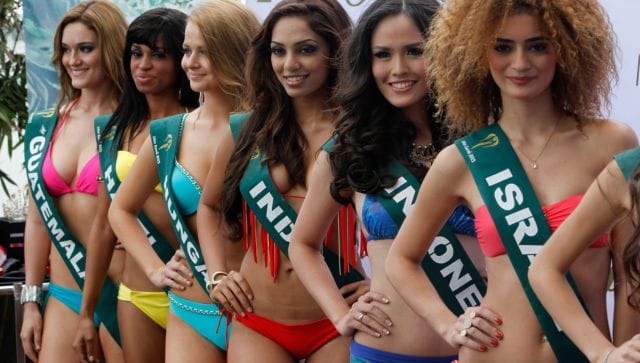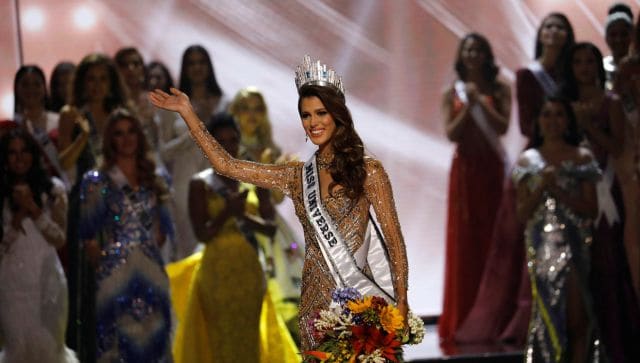)
Miss Universe Indonesia is at the centre of controversy as multiple beauty pageant contestants have filed a police complaint accusing organisers of sexual harassment. The contestants allege they were asked to remove their tops for “body checks” and photographs two days before the finals, reported BBC.
The contest was held in Jakarta from 29 July to 3 August. Let’s take a closer look at the controversy and how relevant beauty pageants are today.
Scandal rocks Miss Universe Indonesia
As per Reuters, five of the six complainants said the organisers asked them to strip to their underwear in a room with over 20 people, including men, for physical examinations.
The organisers allegedly told them they had “to examine any scars, cellulite or tattoos on their bodies”, reported BBC.
Their lawyer, Mellisa Anggraeni, said the five contestants were then photographed topless.
Speaking to the media one of the contestants said, “I feel that my rights have been violated”.
“It has affected me mentally. I have had trouble sleeping,” she said, as per BBC.
According to one of the complainants, she was asked to pose “inappropriately, including by opening her legs”, reported Reuters.
“I felt like I was being peeked on, I was very confused and uncomfortable,” she said at a press conference, broadcast by news channel Kompas TV.
Maria Harfanti, a former Miss Indonesia, told BBC that body checks are normal, but contestants were not usually asked to take off their clothes.
Jakarta Police said they will investigate the matter. The owner of the company that runs the Miss Universe Indonesia Organisation, celebrity Poppy Capella, said in a statement they will probe the allegations, reported BBC.
The global Miss Universe Organisation also said it will look into the matter, adding it takes sexual misconduct allegations “very seriously”.
Recent controversies around beauty pageants
In January, a court in Paris ruled Miss France beauty pageant’s selection process was not discriminatory. This came after a case was filed in October 2021 against the pageant’s parent company, Endemol Production, by feminist activist group Osez le féminisme (Dare to be feminist), along with three unsuccessful applicants, alleging discriminatory entry requirements.
The complainants said the pageant violated French labour laws by asking contestants to be over 1.70 metres tall, single, childless and “representative of beauty”.
“Beyond exploiting women for economic gain, this contest, through the violations of the law of which it is guilty, has a negative and retrograde impact on the whole of society,” Osez le féminisme said in its news statement at the time, as per CNN. “It is high time Endemol Production finally removes all sexist clauses from its regulations.”
A debate erupted after the organisers of the Miss England beauty pageant said they were mulling bringing back the swimwear round which was banned in 2009.
Organiser Angie Beasley had vowed she would “refuse to bow to the woke brigade” over the issue. However, as per The Sun report in late June, the organisers decided to ditch the swimsuit round completely.
Elaborating on the decision, Beasley said the competition was “no longer a bathing beauty parade” but instead “celebrates women achievers”, the report added.
Mrs India INC, a beauty pageant for married Indian women, was recently embroiled in a row as some contestants alleged organisers of accepting charity funds from participants. They also claimed that winners were decided on the basis of the sum contributed, reported The Statesman.
The organisers have rejected the allegations and said they will take legal action against those making “false” claims.
Last year, Miss USA was rocked by accusations of rigging.
Opinions have been divided about the relevance of beauty pageants that judge participants mostly on the basis of their looks.
While some have objected to these beauty contests for sexually objectifying women, others argue they celebrate the “strength and beauty” of women’s bodies.
To qualify for Miss Universe, which began in 1952 to promote swimwear, candidates must be between 18 and 28 years old. They are judged on three criteria: an evening gown, a personality interview and a swimsuit competition. Miss World was also created for a similar purpose and was earlier named Festival Bikini Contest, noted Daily Mail.
In 2022, the Miss Universe Organization was bought by Jakapong “Anne” Jakrajutatip, a Thai transgender woman and media mogul, who is trying to make the contest more inclusive by allowing married women , transgender women and single mothers to participate, revoking its 70-year-old rule barring them.
Last August, a Miss England contestant broke away from the pageant’s history by competing without make-up, saying she was “embracing blemishes and imperfections”.
In 2021, Miss Bahrain Manar Nadeem Deyani had refused to wear a bikini during the swimsuit round and instead wore a black outfit.
Writer, researcher and campaigner, Raquel Rosario Sánchez, argued in her piece for Al Jazeera that despite these gestures, beauty pageants in this age seem like “stepping back into a distant past in which women were seen but rarely heard”.
“Policy adjustments and small acts of rebellion from participants cannot obscure the fact that beauty pageants have become increasingly jarring and out of place in our modern age,” she wrote in her piece last September.
Calling these policy changes “superficial”, Sánchez wrote that they “represent marketing strategies that have an expiration date. These must surely be indicators that organisers know the future of beauty pageants is untenable.”
She also noted how viewership of Miss Universe contests has been declining globally. As per Time magazine, Miss Universe, the most high-profile beauty pageant globally, has failed to draw TV audiences for at least the last five years. Its show in 2021 attracted its lowest audience ever with 2.7 million viewers.
Writer and feminist campaigner Julie Bindel wrote for Daily Mail that “pageants are not harmless — they are yet another clear step towards the dehumanisation and monetisation of the female body.”
However, not all agree. former Miss England winner Katrina Hodge who campaigned for cancelling the swimsuit round in the beauty pageant in 2010, told Daily Mail in June that she now regrets her decision.
“I was young and naive and felt like a bad feminist for enjoying posing in swimwear,” Hodge said.
“We were constantly being told by the ‘feminists’ trying to close down beauty pageants that it was wrong and objectifying us, and I felt pressured to go along with it,” she added.
“By successfully ending it, I took away women’s choice and freedoms — I also made the competition highly boring,’ Hodge was quoted as saying by Daily Mail in the article written by author and journalist Helena Frith Powell.
Hodge said she “felt like a bad feminist for enjoying the way she looked and felt” in swimwear.
Powell questioned, “But is there anything more anti-feminist than taking away a woman’s joy and pride in her own body?”





